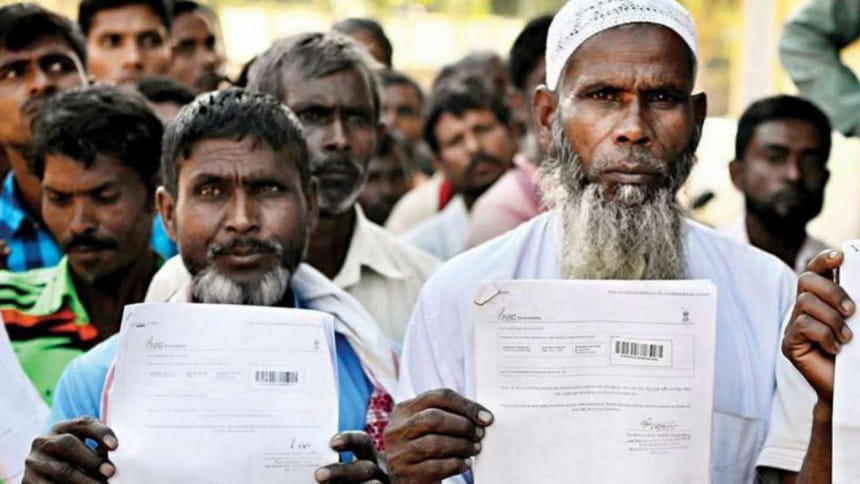The anguish of a people fighting for recognition

My recent op-ed for The Daily Star about the controversial drive for citizenship screening in India's Assam, involving the "illegal" Bengali-origin Muslims, drew considerable attention from the readers, with a particular curiosity about the Miya (also spelled Miyah) poetry used to assert the identity and rights of the people as settlers and citizens of India. While Hindu nationalists led by the ruling Bharatiya Janata Party (BJP) want to weed out what they call Bengali "infiltrators" and "termites," the crisis indeed revived a genre of protest poetry among the Bengali-speaking Muslims in Assam. The Miya poetry has now become a tool for social movement there, highlighting the plight of the Bengali-speaking Muslims who are unfairly labelled by the Assamese media as Bangladeshis.
What is Miya poetry?
Miya poetry is a genre of poems written primarily by Assamese Muslims of Bengali heritage in their native dialect. They are typically confrontational in nature and provide graphic accounts of the stigma and humiliation rooted in the "Miya" identity. Miya, which literally means a respectable gentleman in Urdu, is used as a slur to brand the Bengali-origin or Bengali Muslim settlers in a riverine wasteland in Assam known as Char Chapori in the Brahmaputra plains. They include descendants of people who migrated in the past from various districts of then East Bengal to Assam.
The slur has now been reclaimed by a generation of poets who call themselves and their style of poetry "Miya." The Miya poets have found new expressions through their poetry to speak out against the abuse and injustices meted out to their community, the violent discrimination against the settlers' Muslim communities over the last century as witnessed during the Nellie Massacre in 1983, and finally, the recent fall-out from the National Register of Citizens (NRC) exercise in the state.
Today, Miya poetry is an umbrella term for young poets from within and outside of the Bengali-origin Assamese Muslim community. Among them are Kazi Sharwar, Shahjahan Ali Ahmed, Shalim M Hussain, Rehna Sultana, Abdur Rahim, to name a few. Miya poetry is usually written in Assamese with Char Chapori dialect and then translated into English and other regional dialects. The writings of the Miya poets are all about human rights, identity and the question of citizenship in the wake of the NRC.
Glimpses of anger and humiliation
The early work of this genre dates back to 1939, to a poem written by Moulana Bande Ali. However, Kabir Ahmed's "I beg to State That", written in the aftermath of the Nellie Massacre, is considered as the true beginning of Miya poetry in which he screamed in indignation:
"I beg to state that/I am a settler, a hated Miyah/Whatever may be the case, my name is/Ismail Sheikh, Ramzan Ali or Majid Miyah/Subject - I am an Assamese Asomiya/I have many things to say/Stories older than Assamese folktales/Stories older than the blood/Following through your vein/... I beg to state that I am a /Settler, a dirty Miyah/Whatever be the case, my name/Is Kabir Ahmed or Mijanur Miyah/Subject- I am an Assamese Asomiya/Sometime in the last century, I lost/My address in the storm of the Padma/A merchant's boat found me drifting and dropped me here/Since then I have held close to my heart this land, this earth/And began a journey of discovery…" (translated by Shalim M Hussain)
In 2016, Dr Hafiz Ahmed, president of the Char Chapori Sahitya Parishad, a school teacher and a prominent Miya poet, wrote a very powerful piece titled "Write Down I am a Miya" within the context of the NRC exercise in Assam. The poem paints a bitter tale of the second-class treatment of Miya people in Assam, who are often called "foreigners" in their own land.
"Write/Write Down/I am a Miya/My serial number in the NRC is 200543/I have two children/Another is coming next summer/Will you hate him, as you hate me/... Write Down I am a Miyah/A citizen of a democratic, secular Republic/Without any right/My mother has been made a D voter/Though her parents are Indian/... Write Down I am a Miyah/Living on the Brahmaputra/Tolerating your torture/My body has turned black/My eyes red with fire/Be Aware!/I have nothing but anger in stock/Keep way!/Or Turn to Ashes." (National Herald, July 12, 2019).
Reactions to Miya poetry
The controversy surrounding Miya poetry took a new turn after a group of Miya poets uploaded on social media a video of a reading of "Write Down I am a Miya". This took place on the backdrop of the publication of the final NRC list in July. On the basis of a complaint filed by a local journalist named Pranabjit Doloi, the Assam Police registered an FIR against ten Miya poets and activists, including Dr Hafiz Ahmed, for criminal conspiracy and spreading messages for social disharmony. The complainant alleged that the poem paints the Assamese people as "xenophobic." Another allegation is that the Miya poetry is an insult and threat to Assamese language since it uses local dialects.
The Miya poets condemned the allegation as baseless and wilful misreading of the poems. A large number of Miya poems are also written in Assamese, some in English and Hindi, and a handful in local dialects. Four of the ten accused in the FIR are finishing PhDs in Assamese language and literature. Dr Hafiz Ahmed is an acclaimed Assamese writer, propagator of Assamese language and literature and public scholar. The controversy around Miya poetry and the NRC are an indication that Assam is turning against itself and its own people.
Violence in Assam and beyond
Violent protests have erupted in Assam, West Bengal, Delhi and many other parts of India over the controversial Citizenship Amendment Bill turned into law recently, excluding the Muslims. Prior to that, in Assam, the NRC left out 1.9 million people unable to prove their status in the state prior to 1971, leaving them to face possible deportation. After the citizenship bill was passed in parliament, the United Nations has voiced concern that the new law is "fundamentally discriminatory in nature" and called for it to be reviewed. In view of the ongoing violence, the Japanese prime minister has postponed his trip to Assam for a scheduled summit with the Indian prime minister. Bangladesh's foreign minister and home minister have also cancelled their trips to India. The violence in Assam is likely to continue unless the rights of the Bengali Assamese are duly recognised by the state of Assam and India.
Mohammad Zaman is an international development/resettlement specialist and advisory professor at the National Research Centre for Resettlement (NRCR), Hohai University, Nanjing, China. Email: [email protected]

 For all latest news, follow The Daily Star's Google News channel.
For all latest news, follow The Daily Star's Google News channel. 



Comments